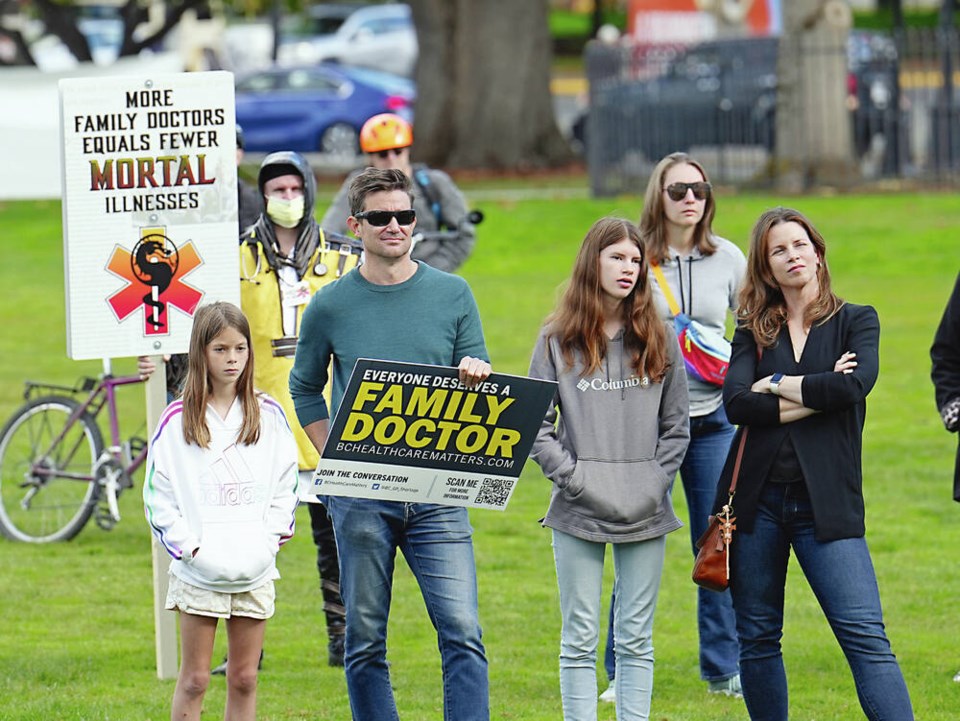Dr. Martina Scholtens left family practice to become a psychiatrist and is now faced with a new dilemma — how to treat patients who don’t have the support of a family doctor.
Scholtens attended a B.C. Health Care Matters rally at the B.C. legislature on Saturday to support those calling on the province to improve access to family doctors. About 200 people attended.
Scholtens was a family doctor before switching to psychiatry. She recently graduated and plans to set up her own practice.
“Being a family doctor for 12 years and experiencing all the challenges with that work in our current system in B.C., I could not imagine myself working in family practice for another 30 years,” said Scholtens.
Scholtens attended the rally with her husband, Peter, and two of their four children.
“If the system had been different and changes had been made, I could have very well stayed a family physician, so in a way, I feel my own personal responsibility with respect to the shortage,” said Scholtens.
As a resident psychiatrist, Scholtens saw the other side of the family doctor shortage — patients who came to her sicker because they didn’t have adequate primary care, patients who couldn’t be helped to the same degree without the support of a family physician.
“Certainly there are patients who are unwell who are waiting far too long to see a psychiatrist and who, if they had had a family physician — well trained in dealing with mental-health issues — they would not be as severely impacted by the time they see a psychiatrist.”
While working as a resident psychiatrist, the first question she asked patients was whether they had a family doctor “because of how much impact that would have on their care going forward,” said Scholtens. “I knew that their care and prognosis was so much better” with a family doctor.
An estimated one million people in B.C. do not have a family doctor, about 100,000 on the south Island.
When Scholtens opens her practice she has to decide whether to take on patients who don’t have a family doctor.
“If I only see patients who have a family physician, that’s unfair to those very many patients in Victoria who do not have a family doctor,” said Scholtens.
“But if I see patients without a family doctor then it reduces my capacity to see patients in general because I don’t have the family doctor that I can refer back to, who can kind of quarterback the care.”
Scholtens went to medical school with one of the physician speakers at the rally, Dr. Jennifer Lush, an outspoken advocate for the health-care system, but it was Scholtens’ husband Peter, who works in software, who encouraged the family to attend.
Peter Scholtens said he sees the “moral distress” the doctor shortage has placed not only on his family but many doctors seeing patients in emergency situations only to send them back into the community without the supports they need.
“It’s seeing that frustration every day and knowing it doesn’t have to be that way, knowing that 30 years ago it wasn’t like this, and we just let it happen,” said Peter Scholtens. “It’s ridiculous.”
Lush, a family doctor in Saanich, told the story of a new doctor who took on a patient in 1976 — the year Apple Computers was founded, the CN Tower in Toronto was built, and the film Rocky was released.
The doctor saw that patient through her kids’ illnesses, her dying parents, financial worries, and eventually her blindness and institutionalization.
On Oct. 4, that doctor saw his patient through her death. On that last home visit, although they usually spoke in English, he said a few words to her in German. He knew it was her first language and that it would bring comfort to the patient and her grieving daughters whom he had known since they were ages 2 and 12, said Lush.
Lush was speaking about her own mother, underscoring the value of having a family doctor.
She spoke at a B.C. Health Care Matters rally in May, applauding doctors for the work they were doing “in the face of seemingly overwhelming odds” and returned to Saturday’s rally to say “the crisis … is worse.”
Lush said she knows physicians who have left their practice in just the past five months. None of the doctors who have trained in Lush’s clinic can afford to have a practice of their own, she said.
This month through January the Health Ministry is distributing $118 million in funding to family doctors — about $25,000 per family physician in a primary care practice or walk-in — to help with operating costs until a new Physician Master Agreement is negotiated.
The Health Ministry has also signed on 45 newly graduated family doctors through cash incentives, loan forgiveness and contracts. The province is in discussions with another 65, and an additional 20 or so have expressed interest.
During the rally Lush said the government is taking a “whack-a-mole” approach. She read a statement from the year 2000 by then health minister Mike Farnworth in which he acknowledged the problems of doctor burnout, overhead and administrative pressures. “So if nothing has changed in 22 years, will it ever change?” asked Lush.
>>> To comment on this article, write a letter to the editor: [email protected]
Note to readers: This story has been corrected. An earlier version misstated the amount of funding being distributed to family doctors in primary care practices or walk-in clinics. It is about $25,000 pe physician.




